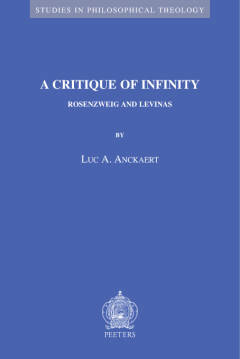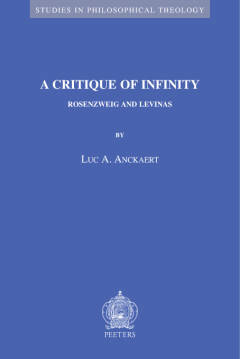
Bedankt voor het vertrouwen het afgelopen jaar! Om jou te bedanken bieden we GRATIS verzending (in België) aan op alles gedurende de hele maand januari.
- Afhalen na 1 uur in een winkel met voorraad
- In januari gratis thuislevering in België
- Ruim aanbod met 7 miljoen producten
Bedankt voor het vertrouwen het afgelopen jaar! Om jou te bedanken bieden we GRATIS verzending (in België) aan op alles gedurende de hele maand januari.
- Afhalen na 1 uur in een winkel met voorraad
- In januari gratis thuislevering in België
- Ruim aanbod met 7 miljoen producten
Zoeken
Omschrijving
Levinas writes that Rosenzweig is too present in his work to be cited. This cryptic suggestion is unfolded into an in-depth confrontation. Both philosophers implement the same speculative gesture. Rosenzweig writes in post-Hegelian times; Levinas's thinking is enriched by phenomenology and marked by the Holocaust. Their critical exploration of the relationship to the infinite offers radically new perspectives on the language, the time and the other. The confrontation raises serious questions. How is a concept of alterity possible without accepting an identity? What are the concealed presuppositions? The questions lead to a critical analysis that cautiously explores the boundaries of dialogical thinking. But it is also the expression of the esteem held for the strong power of inspiration. As such, this book is both a critique and a tribute to Rosenzweig and Levinas. The book contains an exhaustive bibliography of the comparative studies. The manuscript was gold awarded by the Teylers Fellowship of Haarlem (the Netherlands).
Specificaties
Betrokkenen
- Auteur(s):
- Uitgeverij:
Inhoud
- Aantal bladzijden:
- 124
- Taal:
- Engels
- Reeks:
- Reeksnummer:
- nr. 35
Eigenschappen
- Productcode (EAN):
- 9789042918160
- Verschijningsdatum:
- 12/10/2006
- Uitvoering:
- Paperback
- Formaat:
- Trade paperback (VS)
- Afmetingen:
- 162 mm x 239 mm
- Gewicht:
- 263 g

Alleen bij Standaard Boekhandel
+ 80 punten op je klantenkaart van Standaard Boekhandel
Beoordelingen
We publiceren alleen reviews die voldoen aan de voorwaarden voor reviews. Bekijk onze voorwaarden voor reviews.









